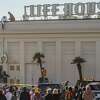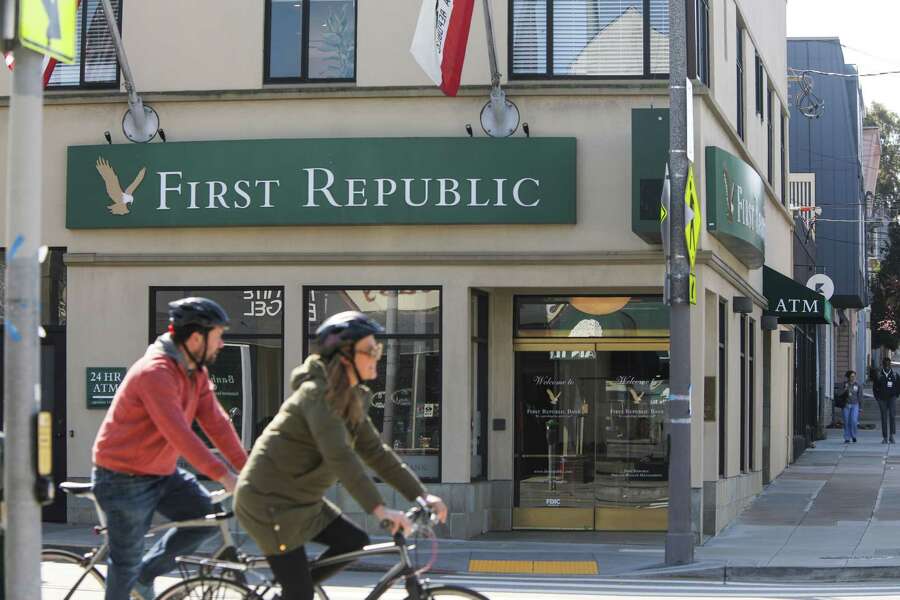
Bikers ride by First Republic Bank on San Francisco’s Irving Street in March. First Republic Bank lost $72 billion in deposits before its bailout.
Juliana Yamada/The ChronicleSan Francisco’s First Republic Bank, whichaverted disaster last monthwhen a group of the nation’s largest banks stepped in to fill its coffers with $30 billion in emergency money asdepositors began heading for the exits首次报道,c以来的财务业绩risis. And the numbers show exactly how much confidence onetime depositors lost in the bank: about $72 billion worth.
That’s how much the bank’s deposits dropped during the first quarter of 2023, a number that could have been higher if not for the rescue funds sunk into it by Bank of America, Citigroup, JPMorgan Chase, Wells Fargo, Goldman Sachs, Morgan Stanley, BNY Mellon, PNC Bank, State Street, Truist and U.S. Bank.
The company also said in its earnings report that it plans to cut expenses by not only reducing executive compensation and dropping office space, but also by trimming its workforce 20% to 25% in the coming quarter.
The company had7,213 full-time equivalent employeesas of Dec. 31.
“With the stabilization of our deposit base and the strength of our credit quality and capital position, we continue to take steps to strengthen our business. We remain fully committed to serving our communities, and we are grateful for the ongoing support of our clients and colleagues,” said Jim Herbert, the bank’s founder and executive chairman, and Mike Roffler, its CEO and president, in a statement.
With the large outflow of deposits in the wake of thecollapse of Silicon Valley Banklast month, the company held about $104.5 billion in deposits as of March 31, its most recent earnings report shows.
The company’s uninsured deposits totaled $19.8 billion, or 27% of its total deposits, excluding the infusion of cash from the big banks.
First Republic’s stock, worth more than $120 per share at the start of last month, closed at $16 per share on Monday, sinking lower in after hours trading.
The bank also said in its first-quarter earnings report it is “taking actions to strengthen its business and restructure its balance sheet.” Those included “efforts to increase insured deposits, reduce borrowings from the Federal Reserve Bank, and decrease loan balances to correspond with the reduced reliance on uninsured deposits.
Silicon Valley Bank’s rapid collapse last month, according to an academic study, was the result of aTwitter-fueled runon deposits that caused it to collapse in a matter of days, throwing the future of deposits it held for businesses fromstartups, to nonprofits,towinemakersinto question.
The federal government eventually stepped in to guarantee those deposits entirely beyond the FDIC-insured $250,000 limit, but not before nervous customers began pulling billions out of other financial institutions like First Republic, as fears of a banking contagion spread and depositors began looking to larger institutions for safe financial harbor.
恐慌是不局限于中型银行ke First Republic or even the U.S. as Credit Suisse lost $68 billion in deposits during the last quarter during the pandemic, outflows that are continuing, according toReuters.
Reach Chase DiFeliciantonio: chase.difeliciantonio@sfchronicle.com; Twitter: @ChaseDiFelico
















